Banned Books Week: 'Standing Behind the Counter Workin' It'



Change in the book industry will continue to occur rapidly and the businesses that will succeed are those that simultaneously anticipate and adapt to change. In large part, this means meeting the needs of consumers who want to read what they want, when and where they want and in whatever medium they want. Such was the consensus among speakers during the annual meeting of the Book Industry Study Group, held last Friday in New York City.
For her part, outgoing BISG president Dominique Raccah of Sourcebooks warned that we will all face "much more dramatic change. We're just at the beginning; we're not even a third of the way in." And change will be "nonintegrative and much more disruptive." Things have changed so much that her company has redefined itself, she said. "We are about books and authors, not content. I thought we would be a publisher and not be about books. Now I'm a developer in the book space."
Citing litigation and new "device after device after device," among other things, Len Vlahos noted that much has happened in the year since he began as executive director of BISG. "In some ways, the book industry is more like the consumer electronics industry than the genteel carriage trade" of legend. Still, he said, there are constants that make BISG important: "As long as someone wants a book and someone else wants to buy it, there will be a supply chain." And inevitably, he said, there is "friction in the supply chain."
Tara Catogge, senior v-p of inbound supply chain at ReaderLink Distribution Services and a self-confessed numbers junkie, reviewed some 2011 data in BookStats, BISG's treasure trove of data, pointing out that direct-to-consumer sales are "really vibrant in a lot of areas," particularly in hardcover, which grew 168% in DTC sales, primarily because of the growth of professional sales of 83%. This is advantageous to publishers because it increases conversations with consumers.
In retail, bookstore sales were down 11%, with chains down 22% and indies down 18%. At the same time, online retail--including printed and e-books not sold in stores--is now 18% of sales overall and represents "a vast shift from Borders to online sales," with the exception of younger readers and below, Catogge said.
E-book sales, totally just under $2 billion, represented 20% of publishers' net trade sales in 2011. The big growth lately in the religion category in e-books came in large part because space for titles is shrinking at Walmart and Target, and the CBA market is contracting.
In the big shift to digital, many readers remain devoted to print, Catogge said, but "we have not yet seen a crest in migration yet." The data, she continued, is "indicative of joy people are having in reading again. People enjoy the ability to read whatever they want, wherever they are, in any format they want."
Maureen McMahon, president and publisher of Kaplan Publishing, said that some publishers may be overly concerned with the book rather than "on the job the customer hired us to do, which is to entertain them."
Ken Michaels, president and COO of the Hachette Book Group, concurred, saying that "all boils down to consumers and their needs." He noted, too, that Hachette sees just as much friction internationally in the supply chain as in the U.S.
Tom Turvey, director of strategic partnerships at Google, said that his company has been "on a tear" launching stores internationally, and he is struck by how far ahead the U.S. is--"far, far ahead in a lot of ways." But there is more change to come. A lot of innovation is sparked by retailers--and will lead to so much change that "five years won't remotely be as it is now."
Several companies said they hire differently in the era of change. Kaplan looks for people with "the ability to learn and the ability to teach," McMahon said.
No surprise: Google hires people with technology knowledge. "If technology is driving the change and driving the business, we need more people who understand technology," Turvey said. "We probably don't need any more businesspeople."
Michaels cautioned that traditional functions "will still be there," especially considering that the current revenue model is still "70% print." For example, there will always be art departments. And publicity will be ever more important because "we have to brand our authors and give them the widest possible reach." He added that "principles don't change": companies need to "be willing to adapt and innovate to meet the fundamental needs of consumers."
Several panelists expressed concerns about discoverability. As Raccah put it, "We're living in a world with a glut of content." As a result, Sourcebooks puts an emphasis on trying to break through by focusing on, among other things, covers and first pages. "There is not a second chance," she said.
Turvey said that with "millions of books that anyone can buy," consumers want "an authoritative voice" they can turn to and say, "I bought there and had incredible experience and will return to it." In bricks-and-mortar stores, this authoritative voice has been handselling, but in the digital world, "handselling is very hard to do."
Michaels added that in the digital world, "covers are still a big draw and have to be rendered well" and books must have good metadata, a key BISG area. --John Mutter
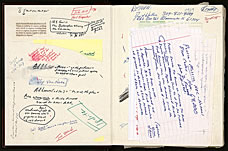 The Harry Ransom Center at the University of Texas in Austin has opened its archival holdings related to The Pale King--David Foster Wallace's posthumous novel--for researchers. The materials were acquired as part of the late author's archive in 2010, but were retained by publisher Little, Brown until after the book's publication in 2011, and subsequent publication of the paperback edition this year. Wallace died in 2008.
The Harry Ransom Center at the University of Texas in Austin has opened its archival holdings related to The Pale King--David Foster Wallace's posthumous novel--for researchers. The materials were acquired as part of the late author's archive in 2010, but were retained by publisher Little, Brown until after the book's publication in 2011, and subsequent publication of the paperback edition this year. Wallace died in 2008.
The holdings, which were organized according to a spreadsheet developed by Wallace's editor, Michael Pietsch (now CEO of Hachette Book Group USA), include handwritten and typescript drafts, outlines, characters lists, research materials and a set of notebooks containing reading notes, names, snippets of dialogue, definitions, quotations and clippings.
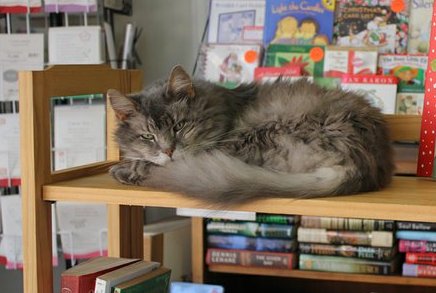 Jinx Junior the bookselling cat still has a job, though under new management. Danielle and Brian Warren will open Well Read bookstore, Fulton, Mo., October 12 at the location formerly occupied by Jinx bookstore, which was put up for sale--along with its resident feline--in July by Kathryn Wade.
Jinx Junior the bookselling cat still has a job, though under new management. Danielle and Brian Warren will open Well Read bookstore, Fulton, Mo., October 12 at the location formerly occupied by Jinx bookstore, which was put up for sale--along with its resident feline--in July by Kathryn Wade.
Danielle told the Fulton Sun that having recently moved to the area, she and her husband knew they wanted to run their own business: "Then I came across the article, and I jokingly said, 'Here's our business.' It was my way of getting a fourth cat. I make cat gifts and sell them on etsy, and he's an avid reader and aspiring writer, so it seemed like a good fit. The more we talked about it and visited, the better the idea seemed."
She also noted that, with her background in design, "the challenge is to breathe some new life and refresh the place. We're going to put in new carpet and paint, we're going to create a kids' room with children's and teens' books and a table and some chairs, I want to intersperse some seating in the shelves and we're going to make a lounge upstairs. I want to make it more of a place where people can linger and hang out."
In addition to new and used books, Well Read also will feature some of Danielle's cat products, book-related gifts and eventually a selection of children's toys as well. Brian said he is "excited about the idea of building a business. We have the inventory and a shell of a store to work with; I'm interested in seeing what we can do with it."
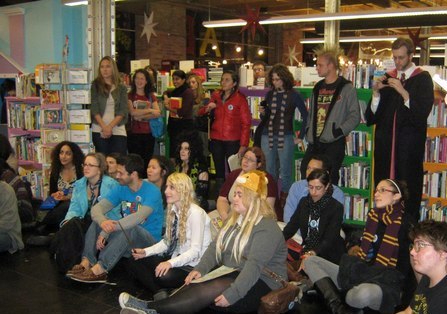
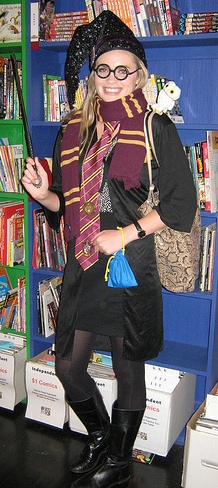
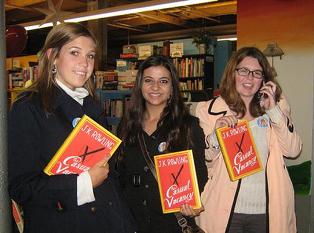 To celebrate the publication of J.K. Rowling's Casual Vacancy, the nonprofit Open Books in Chicago hosted a "Growing Up with Harry Potter Party." The event featured costumes, music, food, trivia contests and drew a crowd of fans. Here, customers and staff (store manager Kevin Elliot in robe, at right in top photo) enjoy the festivities.
To celebrate the publication of J.K. Rowling's Casual Vacancy, the nonprofit Open Books in Chicago hosted a "Growing Up with Harry Potter Party." The event featured costumes, music, food, trivia contests and drew a crowd of fans. Here, customers and staff (store manager Kevin Elliot in robe, at right in top photo) enjoy the festivities.
Who's best qualified to review Stephen Colbert's America Again: Re-becoming the Greatness We Never Weren't (Grand Central, Oct. 2) for GQ magazine? If you answered the revered host of Comedy Central's Colbert Report, you're right.  "Imagine if Faulkner, Hemingway, and Fitzgerald teamed up to write the Greatest American Book. Now imagine that didn't happen and instead Stephen Colbert wrote one. Because that's what happened," observed Colbert, who praised his latest effort as "a work of stunning clarity and bold vision, and it contains some of the greatest hyperbole ever written in the history of mankind. Also, it has pictures. And page numbers, many of them in chronological order!"
"Imagine if Faulkner, Hemingway, and Fitzgerald teamed up to write the Greatest American Book. Now imagine that didn't happen and instead Stephen Colbert wrote one. Because that's what happened," observed Colbert, who praised his latest effort as "a work of stunning clarity and bold vision, and it contains some of the greatest hyperbole ever written in the history of mankind. Also, it has pictures. And page numbers, many of them in chronological order!"

This morning on the Today Show: Rosie Pope, author of Mommy IQ: The Complete Guide to Pregnancy (It Books, $19.99, 9780062192608). She will also appear on Dateline.
Also on the Today Show: Callista Gingrich, co-author of Land of the Pilgrims' Pride (Regnery, $14.95, 9781596988293). She will also appear on Sean Hannity's radio show today and on MSNBC's Morning Joe tomorrow.
---
This morning on Good Morning America: Arnold Schwarzenegger, author of Total Recall: My Unbelievably True Life Story (Simon & Schuster, $35, 9781451662436). He will also appear today on Hannity and the Daily Show and tomorrow on Fox & Friends.
---
Today on NPR's Diane Rehm Show: Kenny Rogers, author of Luck or Something Like It: A Memoir (Morrow, $27.99, 9780062071811).
---
Today on CBS's the Talk: Sarah Ferguson, author of Ballerina Rosie (Paula Wiseman/Simon & Schuster, $16.99, 9781442430662).
---
Today on MSNBC's Rachel Maddow Show: Nate Silver, author of The Signal and the Noise: Why So Many Predictions Fail-but Some Don't (Penguin Press, $27.95, 9781594204111).
---
Today on Tavis Smiley: Andrew McCarthy, author of The Longest Way Home: One Man's Quest for the Courage to Settle Down (Free Press, $26, 9781451667486). He will also appear today on Extra and tomorrow on Access Hollywood.
---
Tonight on the Late Show with David Letterman: Stephen Colbert, author of America Again: Re-becoming the Greatness We Never Weren't (Grand Central, $28.99, 9780446583978).
---
Tonight on Nightline: Antonio Mendez, author of Argo: How the CIA and Hollywood Pulled Off the Most Audacious Rescue in History (Viking, $26.95, 9780670026227).
---
Tomorrow morning on the Today Show: Stacy London, author of The Truth About Style (Viking, $32.95, 9780670026234).
---
Tomorrow on the Ellen DeGeneres Show: Anthony Robles, co-author of Unstoppable: From Underdog to Undefeated: How I Became a Champion (Gotham, $25, 9781592407774).
---
Tomorrow on the Golf Channel: Dave Pelz, author of Dave Pelz's Putting Games: The More You Play, the Better You Putt (Gotham, $30, 9781592407705).
---
Tomorrow on ABC's Katie: Suzy Spencer, author of Secret Sex Lives: A Year on the Fringes of American Sexuality (Berkley, $16, 9780425219362).
---
Tomorrow on the View: Jenny McCarthy, author of Bad Habits: Confessions of a Recovering Catholic (Hyperion, $26.99, 9781401324650).
---
Tomorrow night on NBC's Last Call with Carson Daly: Deepak Chopra, author of God: A Story of Revelation (HarperOne, $25.99, 9780062020680).
NBC has bought a half-hour comedy project based on Nick Hornby's novel About a Boy, which was adapted as a film in 2002. Deadline.com reported that the show will be developed by Jason Katims (Friday Night Lights, Parenthood) and his True Jack Productions, along with Universal TV and Working Title/Tribeca Productions, "the companies that produced the Hugh Grant-starring feature."
Deadline.com also noted that Katims "liked About a Boy for his first half-hour comedy effort as it's in line with the tone of his work, and he loves exploring surrogate father-son relationships on his shows."
Chilean author Isabel Allende won the 500,000 kroner (US$86,505) Hans Christian Andersen Literature Prize, which is given to a writer "whose works compare with those of the legendary Andersen, who was born in 1805 and wrote about 160 fairytales and poems before his death in 1875," the Associated Press reported. Allende was praised for her "mixture of various ages, cultures, forms of knowledge and myths" that have given her storytelling "wingspan and height."
---
The winners of this year's Dayton Literary Peace Prize are Andrew Krivak's The Sojourn (Bellevue Literary Press) in the fiction category and Adam Hochschild's To End All Wars (Houghton Mifflin Harcourt) for nonfiction, the New York Times reported. Each author receives $10,000 prize and will be honored November 11 in Dayton, Ohio. The runners-up are Ha Jin for Nanjing Requiem (Pantheon) and Annia Ciezadlo for Day of Honey (Free Press).
---
Winners of this year's Lane Anderson Awards for Canadian science writing are The Atlantic Coast: A Natural History by Nova Scotia by Harry Thurston (adult category) and Nowhere Else on Earth: Standing Tall for the Great Bear Forest by Caitlyn Vernon (young readers), Quillblog reported. Each winner receives $10,000.
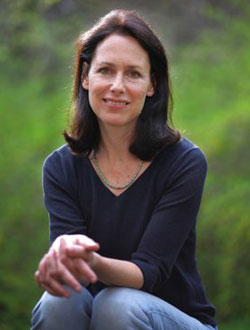 One of the most important things Leslie Brody hopes readers will take from her book, The Last Kiss: A True Story of Love, Joy and Loss, which appears tomorrow (TitleTown Publishing, $17.95, 9780985247850), is that even though it's a natural reaction to believe that life after receiving a "horrible" diagnosis will be "bleak and dreary" afterward, that does not need to be the case. When her husband, Elliot, was diagnosed with pancreatic cancer and told he would be lucky to live another year or two, "we managed to make the best of it and have a rich time along the way," she said. "It was not like life ended. We focused on each other more than the disease."
One of the most important things Leslie Brody hopes readers will take from her book, The Last Kiss: A True Story of Love, Joy and Loss, which appears tomorrow (TitleTown Publishing, $17.95, 9780985247850), is that even though it's a natural reaction to believe that life after receiving a "horrible" diagnosis will be "bleak and dreary" afterward, that does not need to be the case. When her husband, Elliot, was diagnosed with pancreatic cancer and told he would be lucky to live another year or two, "we managed to make the best of it and have a rich time along the way," she said. "It was not like life ended. We focused on each other more than the disease."
In the book, which is by turns a sad, humorous, poignant account of her life with Elliot and coping with his death, Brody gives plenty of evidence of that rich time. There are lots of short chapters "in different moods because I wrote them in different moods," she said. She quotes from the many notes, letters and e-mails that she and Elliot exchanged. ("They were very sustaining," she said, "and I hope this would inspire more husbands and wives to write to each other.") In this way, Elliot, a journalist like Brody, has a voice, too. (Brody called him "a funny, warm guy. He was a kinder, gentler Larry David.")
In part, the book grew out of a series on living with cancer that Brody co-wrote for the Record, the northern New Jersey newspaper she has worked many years (and where she met Elliot). Although the series relied significantly on her experience (and her co-writer's experience), it was a journalist piece that included quotations from experts and discussions about trends in cancer and patient care. The series got "tons of comments," Brody remembered. "It was satisfying to write something that mattered so much."
From there, it was an easy step to writing more about her own experience, something that began with the remembrance she wrote for Elliot's memorial service. "While writing the piece, I felt peaceful," she said. "So I thought I'd keep writing for a while. "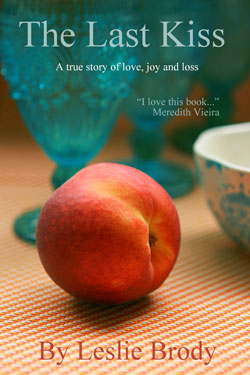 Although she was "not at all confident" that the results would become a book, she worked on it for a year. ("I was lucky to be working part-time then and had a full six hours each Thursday and Friday to myself.") Writing about her life with and without Elliot gave her a purpose, she said. "I saw the narrative of my life gone, and writing gave me a thread. It was wallowing, but because it was wallowing with a purpose, it wasn't really wallowing. By the time it was done, I felt ready to deal with what was next."
Although she was "not at all confident" that the results would become a book, she worked on it for a year. ("I was lucky to be working part-time then and had a full six hours each Thursday and Friday to myself.") Writing about her life with and without Elliot gave her a purpose, she said. "I saw the narrative of my life gone, and writing gave me a thread. It was wallowing, but because it was wallowing with a purpose, it wasn't really wallowing. By the time it was done, I felt ready to deal with what was next."
She found it liberating, too, to write "whatever I wanted" and to write long, she said. At the newspaper, she has many constraints involving length (1,500-word pieces), timing ("I have to hand in a story by five o'clock.") and what she can write about. And she found it exhilarating to "make something good out of an excruciating experience."
While writing, she was guided in part by Nora Roberts's famous basic rule for writing: "ass in the chair," as well as a concept discussed in Bird by Bird by Anne Lamott that went counter to her training as a journalist. "Lamott talks about how after four pages of writing, maybe you have one sentence you like," Brody explained. "I liked the idea that I wasn't wasting most of my time if I worked for hours and had only one good sentence."
Brody also got inspiration from attending the Writing Matters series about "the craft and business of writing," coordinated by Marina Cramer and Jenny Milchman, at Watchung Booksellers in Montclair, N.J., where she lives, as well as from "the many talented and generous people" in town, which includes a range of book people.
Perhaps most important, she took part in a weekly memoir writing workshop led by Laurie Albanese, author of Blue Suburbia: Almost a Memoir, which she called "the greatest thing. I couldn't have finished without it. She gave me deadlines."
Albanese also gave Brody writing prompts, the results of which became a major part of the book. For example, one prompt was to write about sound. Brody wrote about sounds she heard while staying overnight in the hospital some nights with Elliot, which became the chapter in The Last Kiss called "How to Sleep with Your Husband in a Hospital Bed."
In the end, she had 40 responses to the writing prompts, which she laid out "all over my bedroom," then put into order. "I had written at first about after Elliot died, then the earlier parts," she said. "Basically I wrote the book backwards in snippets and then stitched it all together. I wouldn't recommend this."
Does Brody have plans for another book? "Maybe in a while," she said. For now, she is working full-time at the Record, covering education, an "intense, demanding job." A book is such a commitment of time--involving "a lot of sitting inside on beautiful mornings"--and the subject would have to be special, she said. The Last Kiss was "our story," she added. "No one else was going to do it."
Publicity for The Last Kiss starts on Thursday, with a reading at Books & Greetings, Northvale, N.J., followed by a Wednesday, October 10, appearance at Watchung Booksellers, whose Writing Matters series mattered greatly when Brody was writing her book. --John Mutter
Yesterday Morning by Diana Athill (Granta, $13.95 paperback, 9781847084262, October 5, 2012)
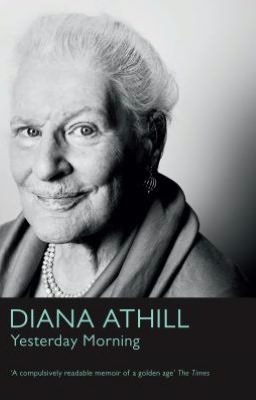
And a magical childhood it was, replete with pony rides, indoor and outdoor games, chores and rather desultory schooling during visits to or long stays at the House, Diana's grandparents' stately home. There was always a random sample of cousins in residence, having been left there while their parents went off to some assignment in a foreign country. "The most important thing about the place, for us children, was its feeling of permanence," Athill writes. "We did not feel deprived of entertainment.... We got our kicks from what was at hand: reading, riding, picnics, swimming in the icy North Sea, dances, acting in our own plays."
This candid memoir recalls the halcyon days of the English countryside in the 1920s. Athill is straightforward in her reminiscences, treating her readers to what she valued (or did not) as a young child. One thing that was unforgivable was being "silly," the most pejorative thing that could be said about someone's actions. This was to be avoided at all costs; never let an adult accuse you of being "silly." Among the children, the accusatory word and concept was "pubbiness." "A pubby person was a person we despised: fat, soft, silly, scared."
She recounts her parents' marriage becoming unhappy and the rows that gave her stomachaches, her mother's affair, the parade of nannies and the everydayness of a child's life when she is privileged and cosseted but still given the freedom to discover what is important to her.
Yesterday Morning is conversational, intimate and explanatory without being so self-referential as to be cloying. At 94, Athill says, "something I like about old age is that you can so easily let your mind drift. The present no longer contains much that demands concentrated thought: no more love affairs, no more work excitements or problems, no more (or very little) planning of entertainment or travel.... What an old person is... is a mobile reservoir of experience." We are lucky indeed to be able to draw from that reservoir. --Valerie Ryan
Shelf Talker: Diana Athill takes us on a beautifully written, thoroughly enjoyable trip to another time, another life.